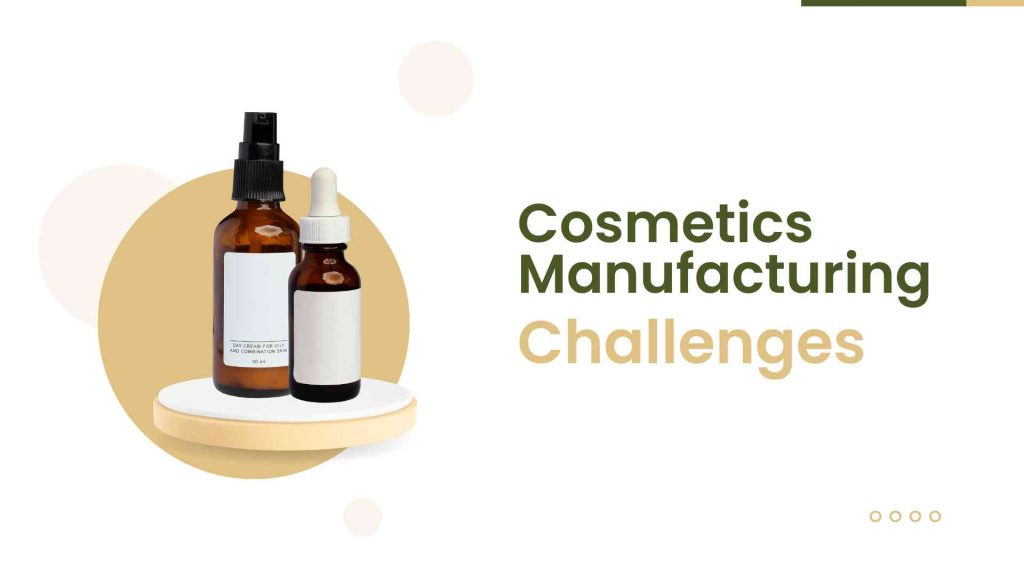The cosmetics industry has noticed growth over the past few years, with a substantial increase in its market value. This surge in demand has brought unprecedented opportunities and presented unique challenges to cosmetics manufacturers. As the industry expands, manufacturers face various production-related obstacles that require innovative solutions to ensure continued success and sustainability.
Production Challenges Facing Cosmetics Manufacturers
The cosmetics manufacturing process requires precise formulations, intricate packaging, and stringent quality control measures. However, the following production challenges have emerged as hurdles that manufacturers must address:
Ingredient Sourcing and Sustainability: Cosmetics manufacturers face the challenge of sourcing high-quality ingredients that are both effective and sustainable. The demand for natural and organic ingredients has grown significantly, leading to potential supply chain disruptions and difficulty maintaining consistency.
Regulatory Compliance: The cosmetics industry is subject to many regulations to ensure product safety and transparency. Navigating various global regulatory frameworks while maintaining compliance can be complex and time-consuming.
Customization and Personalization: Consumers now seek products tailored to their needs and preferences. This trend toward customization necessitates flexible production processes that can accommodate a diverse range of formulations and packaging options.
Time-to-Market Pressure: Manufacturers face pressure to introduce new products as consumer preferences evolve rapidly. Accelerating the product development timeline without compromising quality presents a significant challenge.
Quality Control and Testing: Maintaining consistent product quality is vital in the cosmetics industry. Rigorous testing protocols are required to ensure products meet safety standards and perform as intended.
Rapid Increase of the Cosmetic Industry’s Worth
The cosmetics industry’s worth has experienced an astonishing upswing due to a convergence of factors, including changing consumer habits, social media influence, and increased focus on self-care. This growth has translated into both opportunities and intensified competition. The demand for cosmetics, skincare, and personal care products is at an all-time high, making it imperative that manufacturers address challenges proactively to capitalize on this expansion.
How to Solve Cosmetics Production Challenges
To tackle the production challenges inherent in the cosmetics industry, manufacturers can adopt several strategies:
Innovative Ingredient Sourcing: Manufacturers should explore diverse ingredient sources while prioritizing sustainability. Investing in research and development can lead to discovering novel, eco-friendly ingredients that cater to consumer preferences and environmental concerns.
Technology Integration: Leveraging cutting-edge technologies like artificial intelligence, machine learning, and automation can streamline production processes, enhance quality control, and expedite time-to-market.
Collaboration and Supply Chain Visibility: Establishing solid partnerships with suppliers and maintaining transparent supply chains can mitigate ingredient sourcing challenges and reduce the risk of disruptions.
Regulatory Expertise: Employing regulatory experts or partnering with regulatory compliance firms can assist manufacturers in navigating the complex landscape of cosmetics regulations, ensuring products meet safety and transparency standards.
Flexible Manufacturing Systems: Implementing adaptable manufacturing processes allows manufacturers to efficiently produce customized and personalized products, catering to the diverse needs of consumers.
Cosmetics Industry & Its Complete Supply Chain Challenges
The cosmetics industry’s challenges extend beyond production and encompass the entire supply chain, from ingredient sourcing to distribution:
- Transportation and Distribution: Ensuring products are transported and distributed while maintaining product integrity and minimizing environmental impact.
- Packaging Innovation: Reducing waste through sustainable packaging solutions and minimizing the environmental footprint of cosmetic products.
- Retail and E-commerce Integration: Meeting consumer expectations for seamless shopping experiences across traditional retail and online platforms.
Key Benefits of ERP in the Cosmetic Industry
Acumatica ERP offers substantial advantages to cosmetics manufacturers in addressing challenges and optimizing operations:
- Streamlined Operations: ERP systems integrate various processes, enhancing visibility and enabling smoother communication across departments.
- Inventory Management: Efficient inventory tracking helps manufacturers manage raw materials and finished products, reducing waste and costs.
- Regulatory Compliance: ERP systems can be tailored to manage regulatory requirements, ensuring products meet safety and transparency standards.
- Data-Driven Insights: Access to real-time data and analytics empowers decision-making, enabling manufacturers to respond swiftly to market changes.
In conclusion, while the cosmetics industry’s growth presents numerous opportunities, it also brings forth production and supply chain challenges that must be met with innovation and strategic planning. By addressing ingredient sourcing, regulatory compliance, customization demands, and embracing technology, cosmetics manufacturers can navigate these challenges successfully, ensuring the industry’s continued growth and success in the ever-evolving market.

Vijay comes with a vast experience in ERP and enterprise solutions space with about 20 years of experience in various packaged application like Acumatica, SAP, Orion, Salesforce.com, SugarCRM and, SalesLogix.

